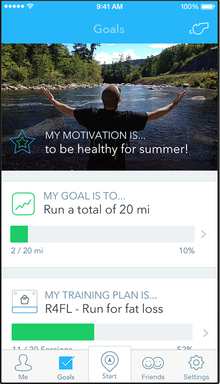 Apps can help increase the amount of leisure time that users spend exercising as well as positively impacting their BMI, according to a new study in the Journal of Medical Internet Research. The researchers surveyed 726 people via Amazon's Mechanical Turk on their usage of exercise apps and their exercise habits. It was conducted by researchers from Lander College, Columbia University, Long Island University, and Marymount Manhattan College.
Apps can help increase the amount of leisure time that users spend exercising as well as positively impacting their BMI, according to a new study in the Journal of Medical Internet Research. The researchers surveyed 726 people via Amazon's Mechanical Turk on their usage of exercise apps and their exercise habits. It was conducted by researchers from Lander College, Columbia University, Long Island University, and Marymount Manhattan College.
Sixty-three percent of the sample group had never used an exercise app, 16 percent had used an app in the past but no longer used it, and 20 percent currently used an exercise app.
Current users were 27 percent more likely than the other two groups to self-report being active. The survey results showed that the groups reported being equally active during non-leisure time, for example, from incidental exercise like walking to work. The app users, however, said they were more active than other groups said they were during leisure time. Lower body mass index was also correlated with higher app usage in the study.
But study authors dug deeper in an effort to establish that the observed effects were really a result of causation, rather than mere correlation.
"However, it is still possible that higher interest in exercise, which may be more likely among individuals with lower BMI, can account for both the adoption of an app and the length of its use," study authors wrote. "It is thus still plausible that individuals who are more interested in exercise are more likely to seek out tools, such as exercise apps, which can help them to achieve their goals—but at the same time these individuals would be more likely to exercise even in the absence of such tools. In other words, app users may be natural 'high exercisers', who also have lower BMI."
In order to account for this possibility, researchers also asked those surveyed about their barriers to exercise, such as lack of time, lack of access to exercise facilities, lack of enjoyment of exercise, and-or lack of energy to exercise. If the study were just observing that people who were exercising anyway were now adopting apps, researchers reasoned, the high app users would also be those who reported the fewest barriers to exercising. Instead, the opposite was true.
"Barriers were found to be significant moderators of app use on exercise," researchers wrote. "Individuals who have relatively few barriers were found to be less likely to benefit from exercise apps, likely because their engagement in exercise activity is not hampered by barriers, and these individuals are thus less in need of an intervention. Individuals with relatively high levels of barriers on the other hand were most likely to benefit from using exercise apps -- an effect that extended to their BMI."
Researchers argued that exercise apps increase self-efficacy, which has been proven to be a major predictor of exercise adherence. Next steps in the research will involve looking at particular apps to determine which features are the most efficacious.
"The results presented in this study suggest that apps, as intervention delivery systems, have the potential to significantly improve population exercise levels and may thus have a significant impact on future public health outcomes," the researchers wrote.
















